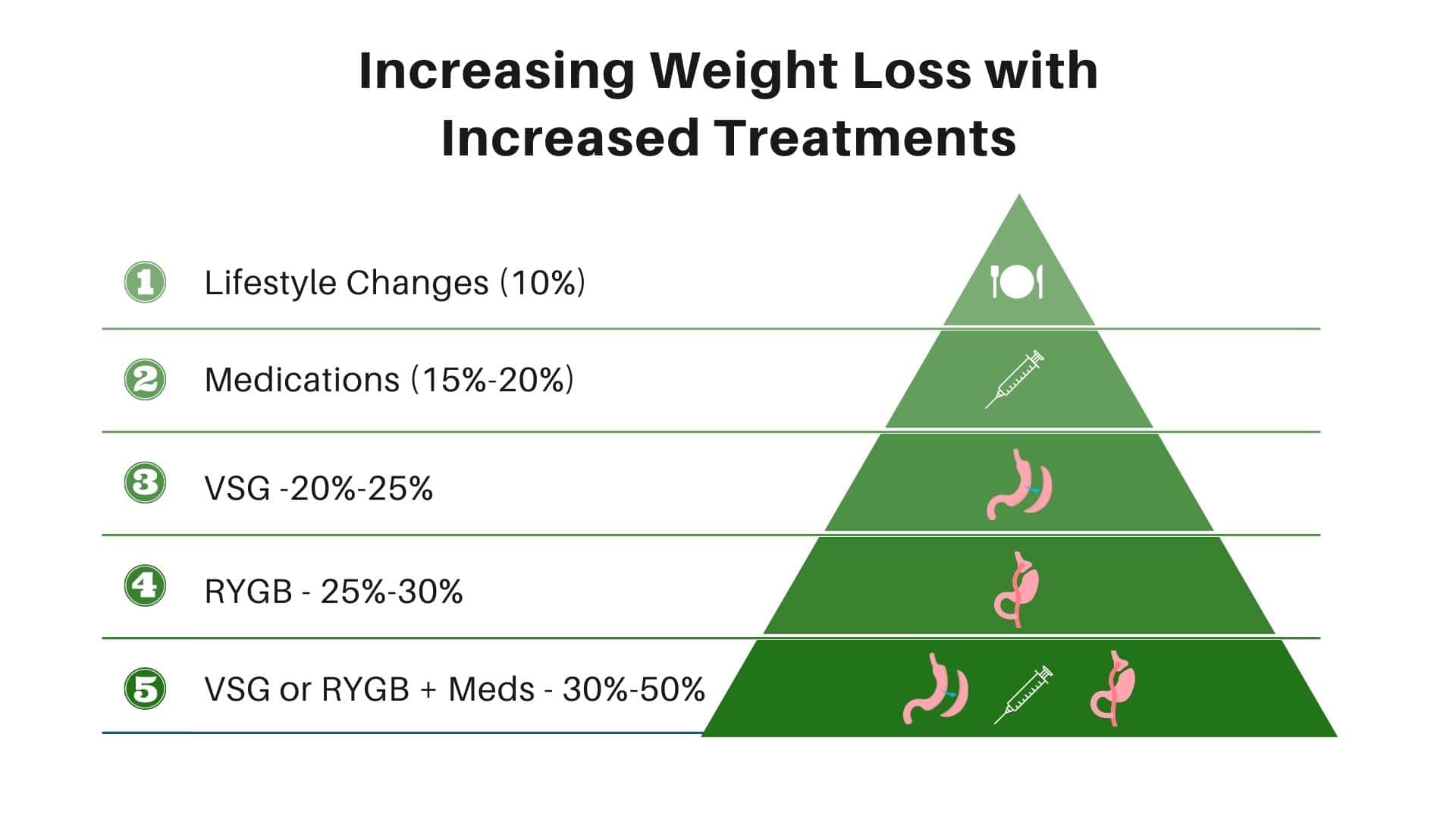The introduction of GLP-1 weight loss medications has forever changed the treatment of the disease of obesity. Initially, I thought that these medications would replace Bariatric Surgery, however, after 18 months and over 1,000 prescriptions, I’ve realized, that, like everything related to obesity, the answer is not that simple. We are finding that the optimal treatment of obesity requires a combination of Bariatric Surgery, GLP-1 Medications, and nutrition.
A Multimodal Approach to Weight Loss
The Pound of Cure philosophy is based on the idea that our body weight is governed by an internal setpoint that works to keep our body fat stores consistent. Just like blood pressure, respiratory rate, and heart rate, our body has a robust neurohormonal system that works directly against our dieting efforts. Any successful weight loss plan must result in a lowering of your setpoint, rather than efforts to fight against it. In order to drive significant, durable changes to your setpoint, it is necessary to combine lifestyle changes, GLP-1 medications, and surgical interventions.

Nutrition: The backbone of all weight loss plans – 5%-10% Total Body Weight Loss
The foundation of any successful weight loss plan is rooted in lifestyle changes. The Pound of Cure nutritional plan involves transitioning most of your diet to focus on fruits, vegetables, beans, lean proteins, nuts, and seeds. Most patients can lose between 5%-10% of their total body weight through lifestyle changes alone. There are exceptions to this – younger people and ironically, those who start with a highly processed diet can lose more. Younger people have a much more flexible setpoint and can lose more weight from dieting and they are also typically capable of much higher-intensity exercise. For those people who eat a highly processed diet, when they change to our Pound of Cure Nutritional Program, they are making a major and substantial change to their diet and are more likely to lose more weight as a result. Our practice’s nutritional program is open to the public and the majority of our support groups are available on Zoom.
GLP-1 Medications: A Paradigm Shift – 10% -15% Total Body Weight Loss
The introduction of GLP-1 (Glucagon-like Peptide-1) medications has revolutionized the treatment of obesity. These medications (semaglutide/Ozempic/Wegovy and tirzepatide/Mounjaro), are not standalone solutions – they are most effective when combined with nutritional therapy. All of the clinical trials that have demonstrated the efficacy of these medications in driving weight loss have integrated a comprehensive nutrition program into their treatment algorithm. In most studies, GLP-1 medications can induce 15-20% total body weight loss. These medications lower your set point, allowing the weight to come off easily, without the constant “food noise” that pervades most dieters’ daily thoughts. However, this set point-lowering effect has a downside – these medications must be used consistently to maintain your new, lower setpoint. For most patients, stopping GLP-1 medications leads to significant weight regain.
Bariatric Surgery: Safer than Ever – 20%-30% Total Body Weight Loss
In our practice, we always start with nutritional counseling and GLP-1 medications when they are covered by the patient’s insurance, or affordable. However, many people want to lose much more than the 15%-20% total body weight loss we typically see with GLP-1 medications and nutrition. Additionally, around 10% of people have a minimal response to GLP-1 medications and 10% can’t tolerate the medications due to unpleasant side effects (often this can be overcome by changing medications or adjusting the dosing strategy). For those who don’t lose enough weight with nutrition and GLP-1 medications, or can’t tolerate or afford the medications, Bariatric Surgery is often their best treatment option. Two prevailing surgical options are Vertical Sleeve Gastrectomy (VSG) and Roux-en-Y Gastric Bypass (RYGB).
Vertical Sleeve Gastrectomy (VSG): This procedure involves removing around 2/3 of your stomach, leaving a thin, “sleeve” shaped stomach in place. VSG typically presents a weight loss potential of 20-25% of total body weight and can be performed in 30-45 minutes as either an outpatient or overnight stay procedure with a 1% serious complication rate. However, around 5% of VSG patients develop significant GERD/heartburn symptoms, often requiring revision to a Gastric Bypass to fully treat. Additionally, a VSG has a much higher rate of weight regain, which, up until recently, was largely untreatable.
Roux-en-Y Gastric Bypass (RYGB): This surgery results in a rerouting of your stomach and intestines into a “Y” shape. This procedure takes around 75 minutes to complete and has a 2% serious complication rate. Gastric Bypass reliably leads to 25-30% total body weight loss. While it delivers impressive weight loss, patients must adhere to stringent dietary guidelines and abstain from alcohol use after surgery since there is a 4% risk of alcoholism in postoperative patients. Gastric Bypass patients tend to have much more durable weight loss and usually don’t require GLP-1 medications for weight loss maintenance.
Stacking Therapies – Surgery, Medications and Nutrition – 30%-50% Total Body Weight Loss
The overwhelming success rates of Bariatric Surgery and GLP-1 medications clearly demonstrate that obesity is a metabolic disease, best treated by medical therapies. Those who continue to preach increased discipline and willpower as the optimal treatment are offering unhelpful and out-of-date advice that should be ignored. Rather than looking at nutrition, medication, and surgical options as a choice to be made, optimal treatment lies in the combination of these treatments. In the past, we’ve believed that most patients will reach their lowest postoperative weight 1-2 years after surgery and that weight regain after surgery was largely untreatable. However, GLP-1 medications have proven both statements wrong. A multimodal approach to the treatment of obesity presents an opportunity for nearly every patient to reach an ideal body weight.
Conclusion
Combining lifestyle changes, GLP-1 medications, and bariatric surgery offers substantial and durable weight loss. Our practice’s goal is to provide “Health and Happiness Through Sustainable Weight Loss,” and this is now an extremely realistic option for the majority of people that we treat in our practice. If you are looking for assistance in losing weight, you should look for a weight loss program that offers high-quality nutritional counseling, GLP-1 medication prescriptions, and Bariatric Surgery options to ensure that you have access to a comprehensive weight loss plan.




Understanding obesity was my issue. I appreciate everything that You and the office has done for me.
Lifelong learning of this disease is key. Obesity didn’t happen overnight and I still don’t think my mindset is 100% out of the eat because I’m bored/stressed stage. Work in progress/programming.
You’ve made an incredible amount of progress – you’re mindset will never be 100% fixed either, nor does it need to be for you to be successful.
I had the sleeve about 2 years ago I have gained back 36lbs. I wish I would have known then that the original bariatric surgery is the best surgery for attainability. My girlfriend had the original surgery 30 years ago and has maintained a heathy weight. What are the chances, that I would be a candidate for second chance surgery? I currently weigh 191 pounds. would my insurance, which is united health care Medicare advantage approve a revision surgery?
If your BMI is >35 with a comorbid condition, or >40 without, you may be a candidate. Most Medicare Advantage patients can get approved for Ozempic – I would start with medications before considering a revision surgery.
see comments above